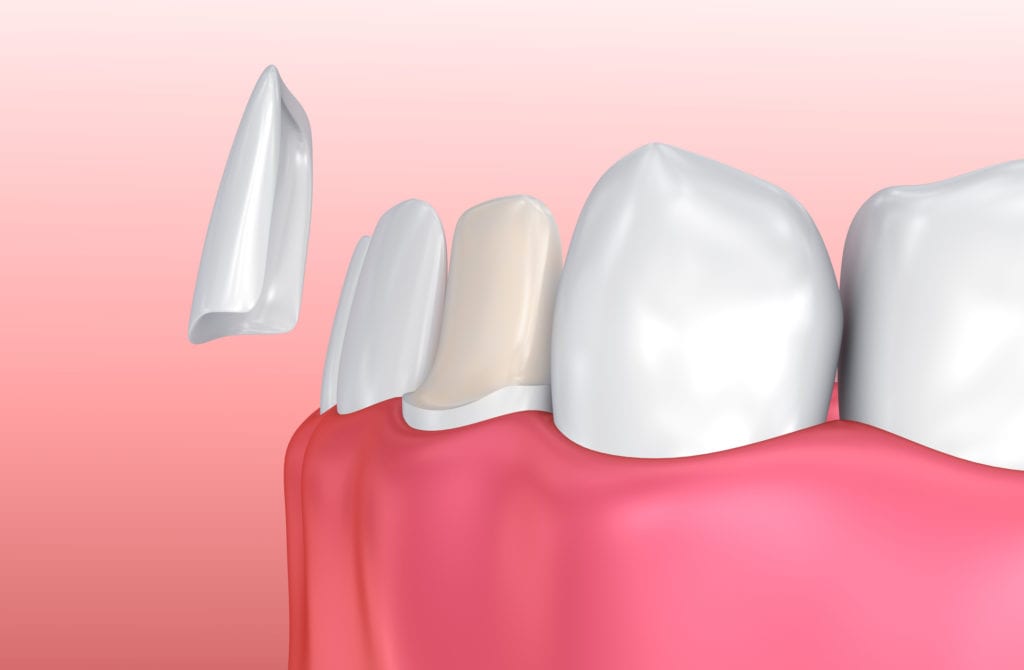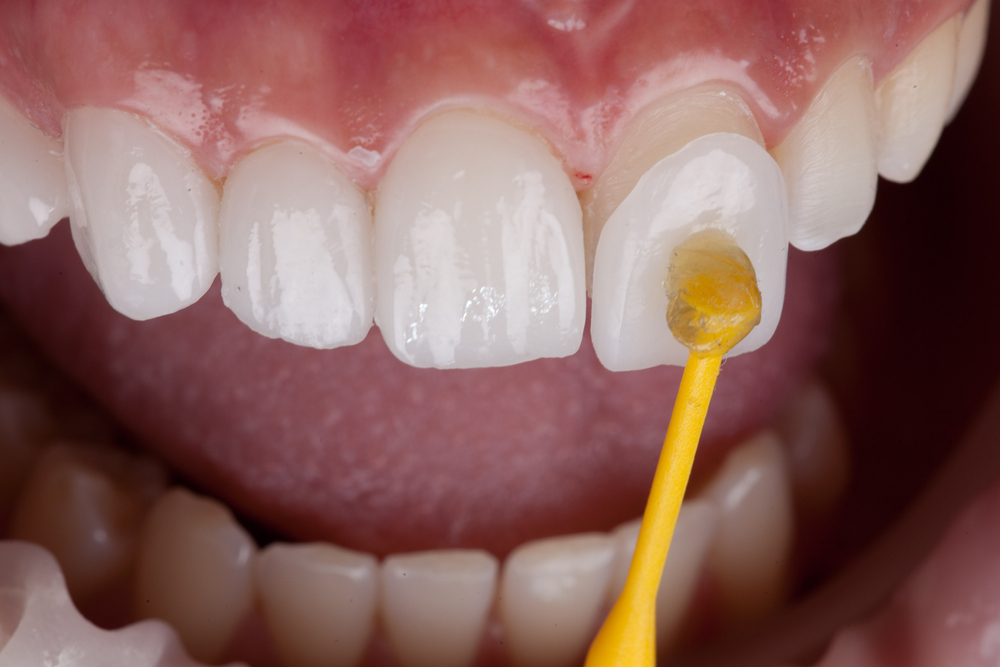Porcelain Veneers: Pros, Cons, and How They Compare to Composites
The Complete Review of Veneers: Types, Makes use of, and Their Effect on Your Smile
Veneers offer as a popular remedy for individuals looking for to improve their dental aesthetics. These custom-crafted coverings can effectively mask flaws such as staining and gaps. With 2 key types offered, porcelain and composite material, each offers unique benefits and limitations. The effect of veneers expands beyond simple look, affecting self-esteem and social interactions. Recognizing their advantages and kinds is important. What might this indicate for one's total quality of life?
Comprehending Veneers: What They Are and Just how They Function
Veneers are thin shells, commonly made from porcelain or composite resin, that are custom-crafted to fit over the front surface of teeth. They offer both visual and useful functions, providing an option for numerous dental flaws such as staining, voids, and minor imbalances. By sticking to the tooth enamel, veneers develop a natural appearance while enhancing the shape and shade of the teeth.
The procedure generally includes a first consultation, where a dental expert analyzes the patient's needs and goes over preferred results - What Are Veneers. Following this, a marginal quantity of enamel may be eliminated to suit the veneer. Impressions of the teeth are after that required to ensure an exact fit. Once made, the veneers are bonded firmly to the teeth using an unique dental adhesive. This procedure not just boosts the smile's appearance however also assists safeguard the underlying teeth from more damages, making veneers a preferred choice for lots of looking for a smile transformation
Kinds of Veneers: Porcelain vs. Composite Resin
The distinction in between porcelain and composite material veneers depends on their material make-up and attributes. Each type uses varying levels of cost, longevity, and longevity, affecting patients' options based on their private needs. Understanding these distinctions is necessary for making an informed choice concerning dental improvements.
Material Differences Discussed
While both porcelain and composite resin veneers serve the exact same cosmetic purpose, they vary significantly in product properties, sturdiness, and visual end results. Porcelain veneers are crafted from a ceramic material that resembles the all-natural transparency of teeth, giving a lifelike appearance. Their smooth surface area is immune to staining, making them an enticing choice for those looking for a long-lasting visual. In comparison, composite resin veneers are made from a tooth-colored plastic material, supplying convenience and ease of application. However, they may not accomplish the very same degree of brightness or clarity as porcelain. Furthermore, composite veneers can be extra easily shaped and fixed, making them a much more adaptable alternative in certain oral scenarios. Each type provides special advantages customized to private preferences.
Longevity and Toughness
When contrasting porcelain and composite resin veneers, durability and toughness are considerable factors. Porcelain veneers are recognized for their stamina, commonly long lasting 10 to 15 years with correct care. Their strength versus damaging and discoloring makes them a preferred option for individuals looking for long-lasting results. In comparison, composite resin veneers typically have a much shorter life expectancy, balancing 5 to 7 years. While they can be repaired a lot more easily if damaged, they are a lot more vulnerable to wear and discoloration gradually. The option between these materials usually depends on the individual's lifestyle, aesthetic goals, and upkeep preferences. Eventually, comprehending the differences in long life and toughness can lead individuals in selecting the veneer kind that finest suits their requirements.
Cost Comparison Insights
When selecting in between porcelain and composite resin veneers, expense is an important factor to consider. Porcelain veneers typically vary from $800 to $2,500 per tooth, reflecting their resilience, visual allure, and resistance to staining. These veneers need a more substantial treatment and specialized laboratory work, contributing to their higher price tag. In comparison, composite material veneers are typically a lot more inexpensive, setting you back between $250 and $1,500 per tooth. They can be used in a single go to, which decreases labor expenses. Composite veneers might require a lot more constant replacements, possibly raising long-term costs. Ultimately, the selection between porcelain and composite resin veneers depends on individual budget plans and preferred results, stabilizing preliminary costs versus longevity and aesthetic results.
The Advantages of Deciding On Veneers for Your Smile
Choosing veneers offers significant benefits for those seeking an improved smile. Their boosted visual appeal can change the look of teeth, while their stain-resistant buildings guarantee a long lasting brightness - What Are Veneers. This mix makes veneers a preferred option for people looking to attain a perfect smile
Boosted Aesthetic Allure
Veneers frequently arise as a popular option due to their transformative aesthetic benefits when individuals look for to improve their smiles. These thin coverings, typically made of porcelain or composite material, can efficiently hide flaws such as chips, voids, and misalignment. By mimicking the natural appearance of teeth, veneers offer a smooth, radiant smile. Their customizable nature enables a tailored approach, making it possible for people to choose tones and forms that finest suit their face features. In addition, veneers can develop an uniform look, boosting general face symmetry. This visual improvement not only enhances confidence however can additionally positively influence individual connections and social interactions, making veneers a popular selection for those aiming to attain a brighter, more eye-catching smile.
Discolor Resistance Conveniences
Veneers not just boost visual allure yet likewise provide considerable tarnish resistance, making them an eye-catching alternative for individuals concerned regarding maintaining a bright smile. Composed of long lasting products such as porcelain or composite material, veneers are much less porous than natural teeth, which assists avoid the absorption of discolorations from usual culprits like coffee, tea, and merlot. This intrinsic tarnish resistance allows people to appreciate their favored drinks without stressing over discoloration. What Are Veneers. Furthermore, the smooth surface area of veneers makes them less complicated to clean, additional enhancing their longevity and maintaining their excellent appearance. Consequently, veneers offer a functional Porcelain Veneers solution for those seeking both elegance and functionality in their oral care
The Refine of Getting Veneers: What to Expect

The procedure of getting veneers might seem intimidating, recognizing the actions involved can relieve worries. An examination with a dentist is required to establish if veneers are the ideal remedy for the individual's dental problems. Throughout this consultation, the dental professional will certainly discuss preferred end results and take impacts of the teeth.
Next, a 2nd consultation is arranged for tooth prep work, where a percentage of enamel is commonly gotten rid of to suit the veneers. Temporary veneers may be put while the personalized ones are crafted in an oral laboratory, which normally takes a number of weeks.
Once prepared, the dental professional will position the veneers, making certain proper fit and color before bonding them to the teeth using an unique adhesive. After last adjustments, the dentist will certainly give assistance on treatment. Recognizing these actions can aid clients feel extra comfy and informed throughout the veneer process.
Upkeep and Take Care Of Your Veneers
Maintaining veneers calls for constant treatment to guarantee their long life and appearance. Proper oral health is important; cleaning two times daily with a non-abrasive toothpaste and flossing consistently assist protect against plaque accumulation around the veneers. In addition, regular dental exams are crucial for checking the problem of the veneers and resolving any potential problems early.
When biting to prevent damage, patients ought to avoid difficult foods and too much force. It's likewise a good idea to limit intake of tarnishing materials, such as coffee, tea, and merlot, as these can impact the veneers' shade with time.

Transforming Your Smile: Real-Life Impact of Veneers
A radiant smile can substantially improve one's self-confidence and total look. For several individuals, veneers work as a transformative solution, efficiently addressing numerous dental worries such as discoloration, spaces, and imbalance. These slim coverings, customized to fit over the front of the teeth, can create an unified and aesthetically pleasing smile.
Real-life situations show the extensive impact veneers can have. Patients commonly report an immediate boost in self-esteem and social interactions following their procedure. The newly found confidence can result in even more chances in individual and specialist life, as people really feel even more likely to engage and share themselves.
Additionally, the psychological advantages expand beyond simple look; numerous experience improved mental health as they accept their smiles. As a result, veneers not only enhance physical characteristics but additionally contribute substantially to general quality of life, underscoring their value in aesthetic dentistry.
Regularly Asked Concerns
For How Long Do Veneers Normally Last Before Requiring Replacement?
Veneers commonly last between 10 to 15 years prior to needing substitute. Elements such as dental hygiene, oral habits, and the sort of material utilized can affect their durability and total toughness. Regular oral check-ups are advisable.
Can Veneers Be Eliminated, and if So, Just how?
Yes, veneers can be eliminated. A dentist normally uses specific devices to carefully remove them from the teeth, making certain minimal damages to the underlying enamel, usually followed by needed changes or remediations for suitable aesthetic appeals.
Are Veneers Suitable for Every person's Dental Condition?

Will Getting Veneers Pain or Require Anesthesia?
Obtaining veneers typically entails minimal pain, and many individuals receive regional anesthesia to ensure a pain-free experience. Level of sensitivity may take place temporarily later, but a lot of find the process bearable and are satisfied with the results.
Just How Do Veneers Affect Tooth Sensitivity After Placement?
Veneers can momentarily enhance tooth level of sensitivity due to the removal of enamel and the bonding procedure. Many people experience a decline in sensitivity gradually as the teeth adapt to the new veneers.
Veneers are slim shells, normally made from porcelain or composite resin, that are custom-crafted to fit over the front surface of teeth. Porcelain veneers are crafted from a ceramic product that mimics the natural transparency of teeth, providing a realistic look. Porcelain veneers normally vary from $800 to $2,500 per tooth, reflecting their toughness, aesthetic charm, and resistance to staining. In comparison, composite material veneers are normally extra inexpensive, setting you back between $250 and $1,500 per tooth. Made up of durable materials such as porcelain or composite material, veneers are much less porous than all-natural teeth, which aids avoid the absorption of stains from typical culprits like coffee, tea, and red white wine.